
International Journal of Computer-Supported Collaborative Learning
Scope & Guideline
Shaping Tomorrow’s Learning with Collaborative Technologies
Introduction
Aims and Scopes
- Collaborative Learning Processes:
The journal explores various collaborative learning processes, focusing on how students interact, negotiate meaning, and co-construct knowledge in both online and offline environments. - Technology Integration in Learning:
A significant emphasis is placed on the role of technology in facilitating collaborative learning, including the use of learning analytics, digital tools, and innovative platforms that support group interactions. - Pedagogical Strategies and Frameworks:
The journal publishes research on different pedagogical strategies, such as collaboration scripts and scaffolding techniques, that enhance group dynamics and learning outcomes. - Analysis of Collaborative Interactions:
Research often includes detailed analyses of collaborative interactions, utilizing various methodologies like network analysis, qualitative assessments, and mixed methods to understand the dynamics of group work. - Interdisciplinary Approaches:
The journal encourages interdisciplinary research that integrates insights from education, psychology, sociology, and computer science to address complex issues in collaborative learning.
Trending and Emerging
- Integration of AI and Learning Analytics:
There is a growing trend towards integrating artificial intelligence and learning analytics in collaborative learning environments, focusing on how these technologies can enhance group interactions and provide real-time feedback. - Immersive Learning Experiences:
Research is increasingly exploring immersive technologies, such as virtual reality (VR) and augmented reality (AR), to create engaging and interactive collaborative learning experiences that transform traditional educational practices. - Sociocultural Perspectives on Collaboration:
Emerging studies are emphasizing sociocultural dimensions of collaboration, such as the impact of cultural diversity and social dynamics on learning processes and outcomes in collaborative settings. - Focus on Teacher's Role in CSCL:
There is a notable increase in research examining the role of teachers and facilitators in computer-supported collaborative learning, particularly how they can effectively guide and support student interactions. - Collaborative Problem-Solving:
Collaborative problem-solving has become a central theme, with researchers investigating frameworks and strategies that enhance students' abilities to work together on complex, knowledge-rich tasks.
Declining or Waning
- Traditional Classroom Dynamics:
Research focusing solely on traditional classroom dynamics without the integration of technology is becoming less prevalent as educational practices increasingly embrace digital tools and online collaboration. - Generalized Collaboration Scripts:
While collaboration scripts have been a significant area of study, there is a noticeable decline in publications that explore generic or non-contextualized scripts, as researchers move towards more tailored and adaptive approaches. - Static Learning Environments:
Investigations into static or non-interactive learning environments are waning, with a stronger emphasis now on immersive and interactive experiences that leverage augmented and virtual reality. - Individual Learning Outcomes:
There is a shift away from focusing solely on individual learning outcomes in collaborative contexts, as the community increasingly recognizes the importance of collective and shared learning experiences. - Simple Assessment Techniques:
Research that relies on basic, non-comprehensive assessment techniques for evaluating collaborative learning is declining, with a preference for more sophisticated analytics and real-time feedback mechanisms.
Similar Journals
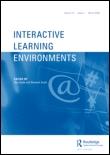
INTERACTIVE LEARNING ENVIRONMENTS
Shaping the next generation of interactive educational practices.INTERACTIVE LEARNING ENVIRONMENTS, published by Routledge Journals, Taylor & Francis Ltd, is a premier peer-reviewed journal that focuses on the intersection of technology and education, dedicated to advancing the understanding of interactive learning methodologies. With an impressive Q1 ranking in both Computer Science Applications and Education, as well as in E-learning, this journal stands out as an authoritative source of innovative research, ranking 28th in Education and 65th in Computer Science according to Scopus metrics. The journal's comprehensive scope covers a broad range of topics, from the effectiveness of haptic feedback in learning environments to the development of adaptive learning technologies, making it a vital resource for researchers, educators, and policy-makers alike. Although currently not an open-access publication, INTERACTIVE LEARNING ENVIRONMENTS provides readers with substantial insights and empirical findings critical for both theoretical and practical applications in the evolving landscape of educational technology.

EDUCATIONAL TECHNOLOGY & SOCIETY
Connecting Research, Practice, and Policy in EducationEDUCATIONAL TECHNOLOGY & SOCIETY is a prestigious, peer-reviewed journal dedicated to advancing the fields of educational technology and its societal implications. Published by the International Forum on Educational Technology and Society at National Taiwan Normal University, this journal has established itself as a transformative platform for research and innovation in education, e-learning, and engineering. With a commendable impact factor reflected in its Q1 quartile rankings across multiple categories, including Education and Sociology, this journal is recognized for its rigorous scholarship and impactful contributions, ranking in the top percentiles within its respective fields. Since its transition to Open Access in 1998, EDUCATIONAL TECHNOLOGY & SOCIETY has provided an invaluable resource for researchers, educators, and policymakers, facilitating the dissemination of cutting-edge research that drives progress in educational practices globally. Whether you are a seasoned researcher or a dedicated student, this journal fosters a vibrant academic community committed to exploring innovative approaches in educational technology.

Luz
Shaping the Future of Social Sciences and HumanitiesLuz is a distinguished academic journal published by CONCIENCIA PUBLICATIONS since 2011, dedicated to advancing knowledge in the fields of social sciences and humanities. With the ISSN 1814-151X and E-ISSN 1814-151X, this Open Access journal ensures unrestricted dissemination of research, enriching the global academic community. Hailing from Holguín, Cuba, it serves as a critical platform for researchers, professionals, and students to share innovative ideas and breakthroughs. Luz aims to foster interdisciplinary dialogue, provide insightful analyses, and promote collaborative research efforts, thus playing an essential role in shaping the scholarly narrative in its fields of focus. The journal's commitment to rigorous peer review and high-quality publications reinforces its significance and credibility, making it a valuable resource for those engaged in serious academic inquiry.
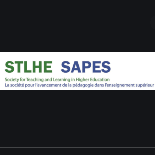
Canadian Journal for the Scholarship of Teaching and Learning
Exploring Evidence-Based Strategies for Effective LearningThe Canadian Journal for the Scholarship of Teaching and Learning (CJSoTL) is a premier open-access journal dedicated to advancing research and discourse in the field of teaching and learning within higher education. Published by SOC TEACHING & LEARNING HIGHER EDUCATION, CJSoTL serves as a vital resource for educators, researchers, and students alike, promoting evidence-based practices and scholarship in higher education pedagogy. Since its inception in 2010, the journal has provided an inclusive platform for innovative research, case studies, and pedagogical strategies that enhance teaching effectiveness and student learning outcomes. Although specific metrics such as H-index and Scopus ranks are currently unlisted, the journal is committed to fostering a community of practice among scholars dedicated to improving teaching and learning environments. With its open-access policy, CJSoTL ensures that valuable knowledge is freely available, aligning with contemporary trends in academic dissemination and accessibility, thus making significant contributions to the scholarship of teaching and learning in Canada and beyond.
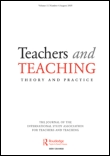
Teachers and Teaching
Shaping the Future of Education Through ResearchTeachers and Teaching is a premier scholarly journal published by Routledge Journals, Taylor & Francis Ltd, providing an essential platform for researchers, educators, and practitioners in the fields of Education and Arts and Humanities. With an editorial focus on the dynamics of teaching and learning, the journal aims to share innovative research and insightful discussions that enhance pedagogical practices and policy development. Notably, it has achieved a Q1 ranking in both the Arts and Humanities and Education categories, signifying its impact and relevance in educational research, as reflected in its Scopus rankings, with an 84th percentile for Arts and Humanities and a 76th percentile in Education. Although it does not offer open access, the journal provides extensive access options for libraries and institutions, making its rich content available to a wide audience. Spanning from 1995 to 2024, Teachers and Teaching continues to set the standard for high-quality scholarship in the evolving landscape of education, inviting contributions that explore challenges and innovations in teaching methodologies.

CALICO Journal
Exploring New Frontiers in Language Learning and Technology.CALICO Journal, published by EQUINOX PUBLISHING LTD, stands at the forefront of research in the intersection of technology and language education. With a prestigious history that spans from 1983 to 2024, this journal has been pivotal in advancing the field, earning high rankings in multiple categories, including Q1 in Education and Linguistics and Language, as well as Q2 in Computer Science Applications. Researchers and educators alike benefit from its wealth of articles that delve into innovative pedagogical strategies, the application of technology in language learning, and the exploration of linguistic theories. Although the journal is not currently open access, its impactful contributions are widely recognized, as evidenced by its strong Scopus rankings, placing it in the 88th percentile for Language and Linguistics. CALICO Journal remains an essential resource for those looking to enhance their practice and expand their knowledge in the dynamic fields of language learning and technology integration.

ETR&D-EDUCATIONAL TECHNOLOGY RESEARCH AND DEVELOPMENT
Exploring the Intersection of Technology and PedagogyETR&D - Educational Technology Research and Development, published by Springer, is a premier journal dedicated to advancing the field of educational technology through rigorous research and development. With a history dating back to 1957, it has established itself as a leading resource for scholars and practitioners, maintaining a remarkable Q1 ranking in Education as of 2023, and standing at an impressive 41st out of 1543 in the Scopus rankings for Social Sciences - Education, placing it in the 97th percentile. This journal aims to bridge the gap between theory and practice, offering in-depth insights into the latest innovations and methodologies in educational technology. As a vital resource for researchers, educators, and technology developers, ETR&D highlights the interplay of technology, pedagogy, and learning environments, driving the evolution of educational practices in a digital era. Although not an open access journal, it provides comprehensive access options for institutional and individual subscribers, ensuring that key findings reach a broad audience. Discover the future of education through ETR&D's influential publications.
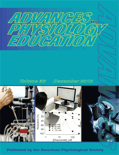
ADVANCES IN PHYSIOLOGY EDUCATION
Innovating Teaching Practices for Tomorrow's ScientistsADVANCES IN PHYSIOLOGY EDUCATION, published by the American Physiological Society, is a leading journal dedicated to the field of physiology education, with a commitment to advancing teaching practices and pedagogical strategies in this vital discipline. Established in 1998, the journal has consistently provided a platform for original research and discussion, fostering the improvement of educational methodologies. With an impressive impact factor and ranked in Q2 for Education and Q3 for Physiology, it reflects a robust academic influence within the research community. The journal ranks #458 out of 1543 in Social Sciences - Education and #130 out of 193 in Biochemistry, Genetics, and Molecular Biology - Physiology according to Scopus, highlighting its critical role in shaping physiology education. While it operates on a subscription model, its focus remains on promoting innovative education practices that benefit both educators and students alike. This journal is essential reading for anyone looking to enhance their understanding of physiology teaching and learning.

LANGUAGE LEARNING & TECHNOLOGY
Advancing Linguistic Horizons with TechnologyLANGUAGE LEARNING & TECHNOLOGY, published by the University of Hawaii's National Foreign Language Resource Center, stands as a pioneering platform within the realms of linguistics, education, and computer science applications. With an impressive impact factor and esteemed rankings—achieving Q1 in Education and Q1 in Linguistics and Language—this open-access journal has been disseminating critical research since its inception in 1997. The journal operates under a commitment to fostering innovative approaches to language learning through technology, making it invaluable for researchers, educators, and practitioners seeking to enhance their understanding of this dynamic intersection. Hailing from the United States, the journal not only promotes scholarly dialogue but also champions accessibility to knowledge, ensuring that the latest advancements in language learning and technology are readily available to a global audience. With converged years documented from 1997 to 1998 and from 2000 to 2021, LANGUAGE LEARNING & TECHNOLOGY continues to play a pivotal role in shaping contemporary discussions around language education and the influence of technology on learning methodologies.
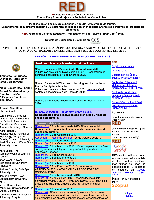
RED-Revista de Educacion a Distancia
Advancing Distance Education Through Innovative ResearchRED-Revista de Educacion a Distancia is a premier open-access journal published by UNIV MURCIA in Spain, dedicated to advancing research in the fields of education and computer science applications. Since its inception in 2001, the journal has served as an essential platform for disseminating innovative research and practical applications of distance education methodologies. With an impressive impact factor and ranked in Q2 across both Computer Science Applications and Education categories as of 2023, RED is recognized for its significant contribution to the scholarly community, particularly within the Social Sciences and Engineering domains. Researchers and professionals are invited to explore cutting-edge studies that underpin pedagogical effectiveness and technological integration in educational settings. Based at the Edificio Pleiades Campus de Espinardo in Murcia, RED continues to foster an engaging dialogue among academics, providing insights that propel the field forward.